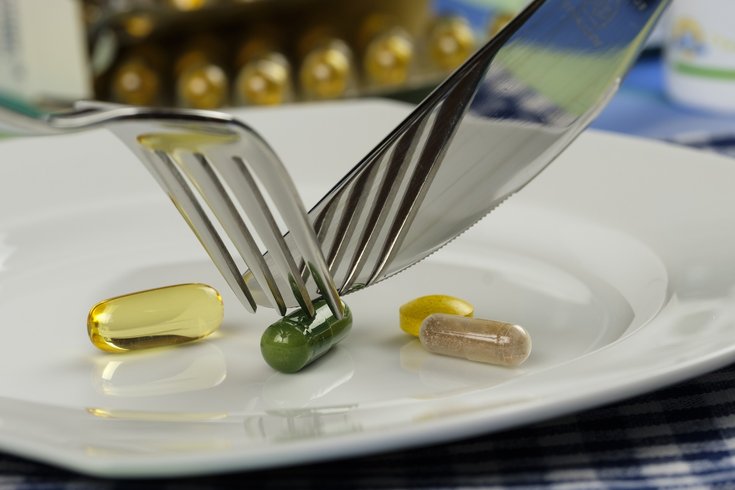
November 04, 2019
 Bru-nO/Pixabay.com
Bru-nO/Pixabay.com
The digestive supplement industry is growing rapidly. But are these products actually helpful?
Are you one of the 60 million to 70 million Americans that is affected by digestive symptoms such as abdominal pain, bloating, gas, nausea, constipation or diarrhea after eating?
It’s hard to not want a quick and easy fix to these symptoms, which can be embarrassing and isolating. I’m seeing more and more patients that are popping some kind of digestive supplement to relieve their symptoms, which they often find advertised by social media influencers or through internet searches.
Emily Rubin, R.D.
I decided to do my own search and found this appealing claim: “All natural physician-formulated to help break down food and promote health digestive function” attached to a digestive pill. I get it. That would make anyone want to try this “miracle” pill.
The digestive supplement industry is growing and growing. It was estimated that the global market for digestive supplements was worth $358 million in 2016, and is expected to grow to more than $1 billion by 2025. Proponents call them life changing; others call them snake oil medicine that is just excreted when you go to the bathroom. Do Americans have the most expensive urine or are these supplements making viable claims?
My biggest concern around supplements is that many people are taking them without asking their physician first. Maybe a friend or coworker told them the benefits of taking the supplement, without mentioning possible side effects. They also wouldn’t know if the supplement would interact with a medication you could be on.
These digestive supplements are not regulated by the U.S. Food and Drug Aadministration for safety or effectiveness. This means you have no idea if the actual amount and ingredients are actually in the product.
RELATED STORY: Navigating the 'nutrition' specialties and why you may be looking for a registered dietitian
When considering supplements for your digestive woes, it is best to work with your gastroenterologist and/or a dietitian. Sometimes the best treatment is to seek out a dietitian to determine your food intolerances. One of the best tools to determine your trigger foods, is a food symptom diary. A trigger food is something that brings on uncomfortable symptoms. For many people, when a trigger food, such as dairy or gluten, is eliminated from their diet, it can dramatically improve their digestive issues, no supplements needed!
Sometimes once you have identified your trigger foods like lactose, you may be able to incorporate one of these enzymes, depending on your needs. They can be especially helpful if you are dining out or traveling, and cannot be sure of what exactly is in your meals. Whatever your digestive issue may be, I would not solely depend on these supplements as the answer to your angry gut!
Standard enzymes contain one or more enzymes, either animal or plant-based, which claim to help the body digest fats, carbohydrate and proteins. They are made from naturally occurring enzymes that your body already produces — such as lipase, amylase and protease — and are usually made up of one enzyme targeted to your specific intolerance, along with other vitamins and ingredients like herbs. There are no proven scientific studies to evaluate their effectiveness. Digestive enzyme supplements also could interact with medications. Ironically, they could cause the opposite effect like abdominal pain, gas and diarrhea, the exact opposite of what they claim to do!
“Gluten-digesting” supplements are marketed for those who have non-celiac gluten sensitivity NCGS and celiac disease who cannot digest gluten. Gluten is a protein found in wheat, rye, and barley. This supplement claims to contain powerful enzymes to break down the protein in gluten and alleviate their symptoms. There is no evidence that these enzymes marketed over-the-counter will break down gluten. Adherence to a 100% gluten-free diet is the only treatment for celiac disease. As far as non-celiac gluten sensitivity, a gluten free diet may be the best treatment as well for those unpleasant GI symptoms.
Marketed for those who have lactose intolerance or have symptoms of pain, bloating, flatulence, nausea and diarrhea beginning 30 minutes to two hours after consuming dairy products. Lactose is the sugar content found in dairy foods and the culprit that causes the digestive symptoms. Lactase is the enzyme that breaks down the lactose. How well this enzyme works depends on the severity of your lactose intolerance and the timing of when these pills are consumed.
I usually recommend buying the food products where the lactase enzyme is already added, such as lactose-free milk and lactose-free cottage cheese. Many of the hard cheeses such as cheddar and parmesan are naturally lactose free. You can also try dairy alternatives such as plant-based products made from almond, coconut, pea and oat. This lactase enzyme could be beneficial, especially if you are dining out and unsure if there is hidden diary, or taken with your favorite ice cream treat.
Peppermint oil is marketed to treat irritable bowel syndrome (IBS) symptoms, like abdominal pain, bloating, diarrhea and constipation. You can buy peppermint oil as a liquid solution as well as capsules and enteric-coated capsules. While some studies indicate that peppermint oil in enteric-coated capsules may improve IBS symptoms, beware of possible side effects, including allergic reactions and heartburn. High doses of peppermint oil can also interfere with absorption of vitamins, minerals and medicines.
These are widely lauded as “gut-friendly” bacteria pills. Probiotics are supplemental live bacteria and microorganisms that provide proper balance of beneficial bacteria in your GI tract. The more common probiotics are Lactobacillus, Bifid bacterium, B. infantis and Saccharomyces boulardii. Probiotics have shown a therapeutic benefit in a variety of health conditions such as, antibiotic-associated diarrhea, infant colic, irritable bowel syndrome and ulcerative colitis.
Even with all this research on probiotics, we still do not know on which probiotics are helpful, safe and most beneficial. Probiotics come in many forms—refrigerated, freeze dried, powder, capsules and chewable. Refrigerated probiotics are very temperature sensitive. If stored below 36 degrees or above 46 degrees, the amount of living bacteria could be gone.
For some of my patients, I recommend a reputable probiotic brand that has been researched. If it helps their GI symptoms, then I tell them to continue taking it. On the other hand, if their symptoms remain the same, or get worse, then I recommend discontinuing the product and maybe trying a different probiotic.
Another great way to include probiotics in your diet is from food sources, such as kombucha, kefir, sauerkraut, yogurt, miso, tempeh and kimchi. Remember, probiotic supplements should never be used in lieu of prescription medication from your doctor.
Emily Rubin, R.D., has been a registered dietitian with Thomas Jefferson’s division of gastroenterology and hepatology for 18 years. She is the dietitian for its celiac center, Fatty Liver Center and Weight Management Center. She is also the public relations chair for the Philadelphia Dietetic Association. She will be writing occasionally on topics related to nutrition and dieting.
 ./.
./.